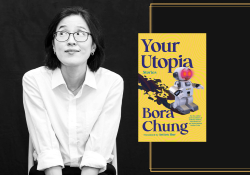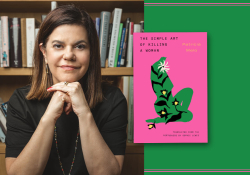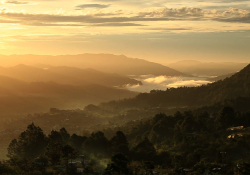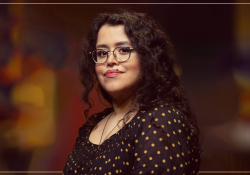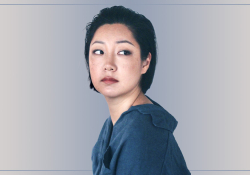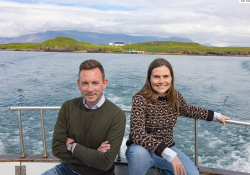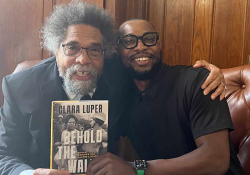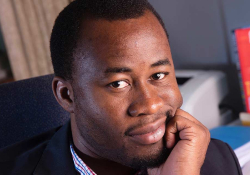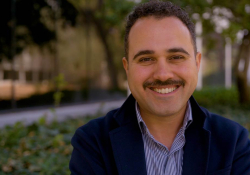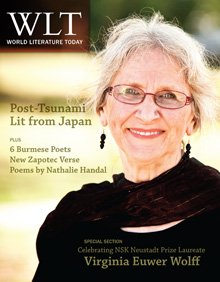In this exclusive WLT interview, poet Nathalie Handal talks about her new verse collection, the distinction between homeland and home, and her sources of strength. Poet in Andalucía is forthcoming from the University of Pittsburgh Press in January 2012.
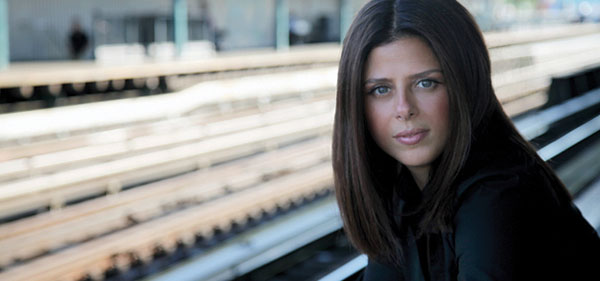
Kaitlin Bankston: In your new collection, Poet in Andalucía, you re-create Federico García Lorca’s journey, Poet in New York, but in reverse. What about Lorca and his travels inspired you? Do you see a part of him in yourself?
Nathalie Handal: I see myself in the landscape Lorca was from. I wanted to go back to the region where I heard convivencia or “coexistence” once existed—where Christians, Jews, and Muslims lived in relative harmony in Islamic Spain. And that desire amplified as the Arab-Israeli conflict worsened. While on this journey, I encountered numerous debates surrounding notions of tolerance in al-Andalus during the Middle Ages, but no one could deny the prosperous cultural and artistic life that existed during that period, one these communities created together. Mahmoud Darwish’s words kept echoing: “Andalus . . . might be here or there, or anywhere . . . a meeting place of strangers in the project of building human culture. . . . It is not only that there was a Jewish-Muslim coexistence, but that the fates of the two people were similar. . . . Al-Andalus for me is the realization of the dream of the poem.”
At the heart of this book is what Lorca said, “Lo que más me importa, es vivir.” As I wrote in this collection:On this journey, I discovered peace is there if we want to find it, because as was true for Lorca, what people want most is to live.
KB: You live your life among borders, traveling. That being the case, is it hard to call any one place home, or do you feel that your home is where you are at that moment?
NH: I have answered this question many times along the years, but I find it more difficult to answer now because I know more—about myself, the world, history. I understand better the complexities I inhabit. My family comes from Bethlehem, but it is not the same Bethlehem. We have lost so much of our history, even though I know history never vanishes. It is heartbreaking. That place is home. I continue to dream of Jerusalem and Bethlehem united again—no wall between them. Sister-cities. I believe in that version of the Holy Land which houses many gods and people. And I can’t forget that place. Even if I try, it reminds me that I will always be part of it.
That said, I have chosen to write, breathe, love in cities—Paris and New York. And I always return somewhere in the Mediterranean, whether it is Greece or the French-Italian border. I need that landscape—the electric blue of the sea, the sun slowly awaking on my face in the mornings, or the cool breeze that seduces night, the lemon, olive, and orange trees (and of course, this scenery reminds me of my ancestral land).
KB: The “otherness” expressed in Poet in Andalucía is from a feeling of not belonging to a specific society. Do you feel that you mirror Lorca in this way? If yes, how so?
NH: Otherness never ends. If you have felt it, you will probably always feel it. The state of being other is prompted by different circumstances, but regardless of the reason, it is that same feeling of misplacement, displacement, a certain vertigo-like sentiment that disturbs the soul. For me, it’s the absence of homeland. I suppose to come back to your previous question, homeland is one thing and home is another. This absence creates a disequilibrium. A continuous restlessness. Yet it’s that turbulence which has impelled me to cultivate what unites instead of what divides.
KB: In “Biznagas,” you discuss the need to belong and how it can take a great deal of time to understand who you are supposed to be in the world. You write, “It takes years to come back from the direction that divides you.” What is it in your life that divides you?
NH: All that I’ve mentioned. . . . But I have mended this division somewhat with the clarity that however terrible the reality might be, I will not be stirred into believing that what seems impossible remains impossible.
KB: What was the hardest part of this collection to write? The most enjoyable?
NH: Initially, it felt like I wrote this book in one long breath. As if I was writing it forever and it finally emerged. I wrote furiously. But the rewriting and revising was extremely difficult—making sure the foreign words worked in the poems, that the historical information was correct, that I was satisfied with my adaptation of certain Arabic poetic forms into English. For example, I wanted to introduce the Qit’a, which means “fragment,” to American and Western readers. It is a short poem in the Arabic tradition, up to ten or twenty lines in English, which tends to concentrate on a single subject or theme. It is thought to have “broken off” from a longer poetic form, the qasida. I also wanted to write an Arabic ghazal. When Americans refer to the ghazal, they are mainly referring to the Persian definition. In Arabic, ghazal refers to a poem dealing with the theme of love, whether long, medium, short, verse, prose, and so on. Additionally, for the purpose of the poem “Convivencia,” the Hebrew equivalent of the ghazal, the tzvi / tzviyah, ya'ala orofer, also means a “roe” or “gazelle” (Song of Songs 4:5, “Thy two breasts [are] like two young roes that are twins, which feed among the lilies”). The proper Hebrew term would be shirei heshek (which literally means “poems of desire”).
I also found it important to have dialogues with some of Lorca’s poems inspired by the Arab Andalusian poets. So my poem “Ghazal/2” is inspired by Lorca’s “Ghazal VII—Ghazal of the Memory of Love,” where the last word of every line ends with o. Furthermore, I alternate between a Spanish and an English word that ends with o. And a certain musical exchange with Lorca seemed unavoidable—for he came to poetry through music. So in different parts of the book, I explore the poem as song or as a form melodic enough that it could be sung. Music is a personage or the humming shadow in the book.
Then there was my endless search for Spanish words that derive from the Arabic. I used many of those words in this collection.
As challenging as this book was to write, everything about the journey was enjoyable.
KB: You were listed as one of the “100 Most Powerful Arab Women in 2011.” Where do your inner strength and powerful voice come from?
NH: I don’t let anything stop me. I allow myself to imagine, and believe.
KB: Do you think it is possible to be considered a poet without being considered a female poet? How so? What obstacles have you encountered as a female poet?
NH: I never think of it in those terms. I know it exists—the genre divide. Certainly, men are more privileged in literary circles. But if you focus on that, you allow these divides to control your space. I think about the craft—in exploring and evolving poetically, stylistically, and aesthetically. In living bravely, and creating freely.
KB: Spiritually, what did you experience in Spain that translated into your poems?
NH: Souls conversing.
KB: You mentioned in the preface that Andalucíais lyrical. What gives the culture its songfulness?
NH: The song life and death compose together as the heart conducts.
KB: Who are a few of your literary inspirations and why?
NH: Some have come into my life when I needed to read their works at that particular moment. Others have passed briefly but delivered a message. And some will remain regulars—Lorca, Darwish, Borges, Ginsberg, Baudelaire, Proust, Akhmatova, Paz, Calvino, García Márquez, Cortázar, Rulfo, Beckett, Montale, Cavafy, Gertrude Stein.
KB: In your words, what makes us human?
NH: Our ability to answer thoughtfully, and change our minds later.
November 2011
Nathalie Handal (www.nathaliehandal.com) is an award-winning poet and playwright. She has lived in Europe, the United States, the Caribbean, Latin America, and the Arab world. She is the author of numerous books, including Love and Strange Horses, winner of the 2011 Gold Medal Independent Publisher Book Award, and an Honorable Mention at the San Francisco Book Festival and the New England Book Festival. The New York Times calls it “a book that trembles with belonging (and longing).” She is the editor of the groundbreaking The Poetry of Arab Women: A Contemporary Anthology, an Academy of American Poets best-seller and winner of the Pen Oakland Josephine Miles Book Award, and the coeditor of the landmark anthology Language for a New Century: Contemporary Poetry from the Middle East, Asia and Beyond, called a “beautiful achievement for world literature” by Nobel laureate Nadine Gordimer. She has been involved as a writer, director, or producer in over twenty theatrical or film productions worldwide; most recently, her work was produced at the John F. Kennedy Center for the Performing Arts, the Bush Theatre, and Westminster Abbey in London. Handal is a Lannan Foundation Fellow, a Fundación Araguaney Fellow, recipient of the Alejo Zuloaga Order in Literature 2011, and an Honored Finalist for the Gift of Freedom Award. She has read her poetry worldwide, has been featured on theNewsHour with Jim Lehrer and National Public Radio, and in the New York Times, the San Francisco Chronicle, Reuters,Mail & Guardian, the Jordan Times, and Il Piccolo. Her work has been translated into more than fifteen languages. She teaches and lectures nationally and internationally, recently in Africa and as Picador Guest Professor, Leipzig University, Germany. She is currently a professor at Columbia University and part of the MFA Faculty at Sierra Nevada College. She writes the blog-column The City and The Writer for Words without Borders. Alice Walker praises Poet in Andalucíaas “poems of depth and weight and the sorrowing song of longing and resolve.”
Kaitlin Bankston is an English literary and cultural studies major at the University of Oklahoma who studied Handal’s work and met her in September 2011 during the Neustadt Festival of International Literature and Culture.
